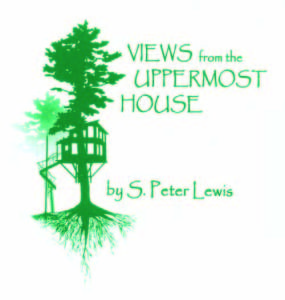Uppermost house: Words that stop me short
By S. Peter Lewis
BN Columnist
I read a lot. Words are my vocation, and (especially on blizzardy February evenings) they spill into my recreation, too. I love the sound of words when they’re good. The pace. The cadence. The sudden image. I agree with Annie Proulx, “I am influenced by words and the chewiness of language.â€
Experts tell us that there about one million English words in current use, although they often hedge and disagree — from Merriam-Webster, “…most linguists would take that estimate with a chunk of salt, and some have said they wouldn't be surprised if it is off the mark by a quarter-million.†If you assume a minimum of two words per sentence (e.g., “Jesus weptâ€) the number of possible sentences is, to be precise, approximately infinite (and that not even taking into account grammar and syntax issues, and the nonsensical word combinations of elected officials).
Now, not all sentences are created equal. “Single-purpose agricultural structures can generate geographically magnified olfactory stress†is a bad sentence. It’s bad the same way it’s bad to discover dessicated houseflies in the potato salad or a puddle of purple fluid under your ’69 Mustang.
But every once in a while, a writer will string a few words into a sentence so stunning that it tickles, stimulates, enlightens, and profoundly lingers. A sentence that stops you instantly and from seemingly out of nowhere, the way plate glass stops a sparrow. A sentence that forces you to read it twice, three, maybe four times and when you’re done you realize that you’ve stopped breathing. Among my favorites are those that carve a tiny facet from life and bounce insight off it like freeway ice glares low sunshine suddenly in through a windshield. Some examples.
“If you live to be a hundred, I want to live to be a hundred minus one day so I never have to live without you.â€
“The paradox of storytelling is that when things go perfectly, there isn’t much to say.â€
“The time not to have a son is eighteen years before a war.â€
“It was a good plan, except that it did not allow for the wit of the universe and the mental lapses of man.â€
“One may stand at the breaker’s edge and study a whole world in one’s hand.â€
“I have lived a great deal among grown-ups. I have seen them intimately, close at hand. And that hasn’t much improved my opinion of them.â€
“Life changes in the instant. The ordinary instant.â€
“I rejoice that there are owls.â€
“He made the stars also.â€
“It’s a life’s work to see yourself for what you really are and even then you might be wrong. And that is something I don’t want to be wrong about.â€
“It is always one’s stance upon uncertain ground that invites the attention of one’s enemies. Or discourages it.â€
“You know, one of the tragedies of real life is that there is no background music.â€
The credits are as follows: Piglet, a fly fisherman, one lamenting the sorrows of fatherhood, a historian describing a tragedy, a man who spent a year alone on a beach, a Little Prince, a woman speaking of personal anguish, a 19th century woodland philosopher, the creator of the universe, a fictional west Texas sheriff, a sadistic murderer, and a brilliant fiction writer.
But as wonderful and provocative as these citations may be, they suffer from a certain distance inherent in the professional sentences of strangers unearthed in a library.
For me, the very best sentences arrive from amateur sources so very much closer to home. For these are the sentences that stop me most suddenly, and birth the most intimate tears.
“I look forward to spending time with you all the time.â€
“I love our life…just don’t ask me to laugh at a dumb joke when I’m real tired and estrogen depleted.â€
“Dad, I know you’ve loved me as long as I’ve lived, but I’ve loved you my whole life.â€
From my friend, my wife, my daughter (the latter via e-mail, of course).


